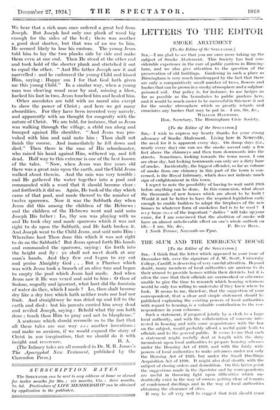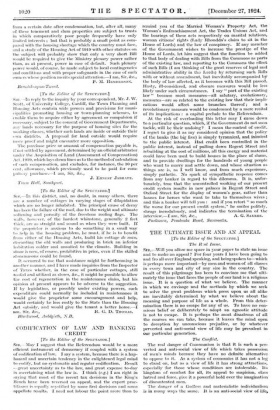THE SLUM AND THE EMERGENCY HOUSE [To the Editor of
the SPECTATOR.] think that the letter which appeared in your issue of December 6th, over the signature of J. W. Scott, University College, Cardiff, is deserving of very careful attention. Beyond doubt, many members of local authorities are anxious to do their utmost to provide houses within their districts, but it often the case that their officials are overworked or otherwise unable to give the time to research which housing reformers would be only too willing to undertake if they knew where to look. It seems to me, therefore, that the suggestion of your correspondent, that a clear and simple statement should b:! published explaining the existing powers of local authorities with regard to housing, is a valuable contribution to the cor- respondence in your columns.
Such a statement, if prepared jointly by a clerk to a large local authority, and with the collaboration of someone inte- rested in housing and with some acquaintance with the law on the subject, would probably afford a useful guide bath to officials and to the general public. It seems to me that such a statement might usefully deal at length with the duty incumbent upon local authorities to prepare housing schemes
under the Housing Act of 1919, and with the fairly wide powers of local authorities to make- advances under not only the Housing Act of 1923, but under the Small Dwellings Acquisition Act of 1899. It might also deal shortly with the subject of closing orders and demolition. On this latter point the suggestions made in the Spectator and by correspondents are useful in throwing light upon difficulties which un- doubtedly exist in the way of owners getting clear of tenants of condemned dwellings and in the way of local authorities obtaining the clearance of sites.
It may b2 all very well to suggest that rent should cease from a certain date after condemnation, but, after all, many _ of these tenement and slum properties are subject to trusts in which comparatively poor people frequently have only limited interests ; but that is probably a small point as com- pared with the housing shortage which the country must face, and a study of the Housing Act of 1919 with other statutes on the subject will probably show that only a very short Bill would be required to give the Ministry plenary power rather than, as at present, power in case of default. Such plenary power would, of course, be made subject to local contingencies and conditions and with proper safeguards in the case of such owners whose position merits special attention.—I am, Sir, &c., P. M. HENDERSON.
Berwick-upon-Tweed.



























 Previous page
Previous page